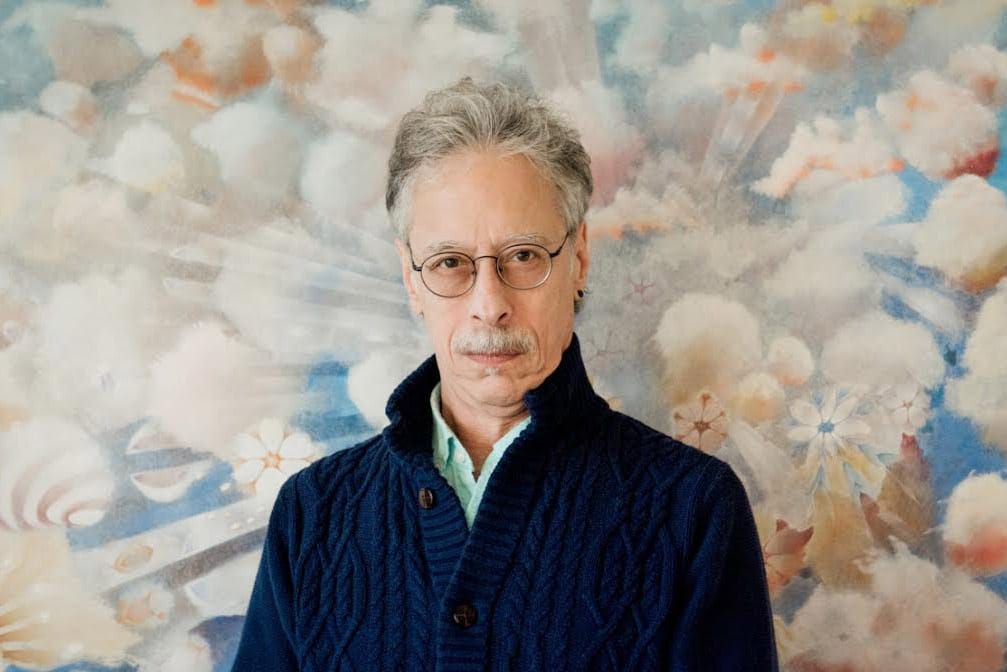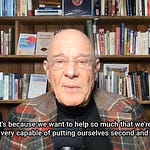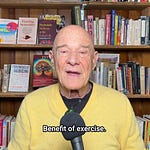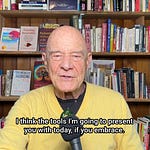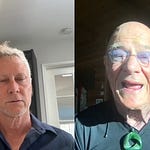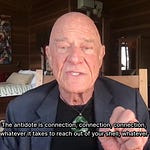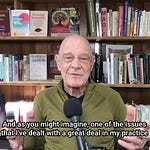In this episode, psychotherapist and researcher Dr. Neal Goldsmith takes us on a journey exploring the nature of consciousness and the universe. We delve into the world of psychospiritual development and the transformative potential of psychedelics, and discuss the importance of breathing and the developmental process in therapy. Neal speaks about the need for a deep understanding of oneself and the universe to become a good therapist. He challenges the notion that psychedelics alone can lead to mature development, and explores the balance between suggestibility and grounded emergence – emphasizing the safety and effectiveness of tribal models for spiritual growth.
We also explore the role of psychedelics in personal growth and the question of whether they can obviate the need for "hard work" in spiritual practices. Neal shares insights on transcending childhood "demons" through blissful psychedelic experiences and the potential implications of psychedelics in medicine, science, and society.
Finally, Goldsmith and I critique capitalism and discusses the negative impact of campaign finance on American politics.
Neal's philosophy centers around healing the rift between humans and nature, integrating opposites, and embracing spirituality and science. His clinical approach emphasizes spiritual maturity and natural unfolding, fostering a broader view of reality and the awakening of one's true self.
About the Guest: Neal M. Goldsmith, Ph.D. is a social psychologist, author, and licensed psychotherapist specializing in psychospiritual development. He is a personality theorist, strategic planner, policy researcher, public speaker, and salonier. Dr. Goldsmith has authored dozens of popular and scholarly articles and curates and hosts innovative workshops, salons, and conferences. He frequently speaks on psychotherapy and resistance to change, adult developmental psychology, psychedelics research, therapy and policy, and the post-modern future of society. Dr. Goldsmith's first book, Psychedelic Healing: The Promise of Entheogens for Psychotherapy and Spiritual Development (Inner Traditions, 2011), describes the influence of psychedelics on the development of his personality theory and clinical practice. He is currently working on his second book, Psyche Therapy: Soul, Death, Love.
P.S. This is the last week I am discounting paid subscriptions by 20%. Subscribers get access to full transcripts of my shows. I am publishing this week’s full transcript as a preview into the perks of being a member of our program. Please consider supporting us.
Mentioned in this Episode…
Psychedelic Healing by Neal Goldsmith
Video clip of Dr. Goldsmith speaking on "Fusion of Spirit and Science”
Summary
What are the potential risks and benefits of using psychedelics for personal growth and spiritual development?
How can we create safe and effective environments for personal spiritual development and psychedelic-friendly events?
What role can psychedelics play in therapy and mental health treatment?
How should psychedelics be regulated and rescheduled?
Can psychedelic experiences transcend or heal childhood traumas?
How can psychedelics be integrated into medicine, science, and society?
How can we educate the general public about psychedelics and their potential benefits?
How do psychedelics fit into the broader drug policy reform movement?
Seeking Psychedelic Testimonials: The Good, the Bad, and the Ugly.
We are currently looking for first-hand accounts of adverse effects of psychedelics—from ‘bad trips,’ to unwanted physiological complications, to abusive practices by guides, therapists, and shamans.
The interviews from this series will go into a forthcoming book on the topic—perhaps the first book its kind.
Please contact me if you would like to be interviewed. You can also leave us a voice message to share your story. We will keep your information anonymous unless you tell us otherwise.
My Books
Freeing Sexuality: Psychologists, Consent Teachers, Polyamory Experts, and Sex Workers Speak Out
Psychedelic Wisdom: The Astonishing Rewards of Mind-Altering Substances
Psychedelic Medicine: The Healing Powers of LSD, MDMA, Psilocybin, and Ayahuasca
Integral Psychedelic Therapy (co-edited with Jason A. Butler & Genesee Herzberg)
NOTE: The podcast is always freely available thanks to our paid subscribers. Please share this post to show your support for transparency. The following transcript distills the key points from this show into a condensed form. It is meant as a reference - listen to the full episode for an accurate rendition of the conversation.
Transcript
Opening Comments [00:00:00]
Dr. Richard L: Welcome to MINDBODY Health and Politics. I'm your host, Dr. Richard Lewis Miller. The mission of Mind-Body Health and Politics is to enhance your physical, emotional, spiritual wellbeing, and encourage community.
I say encourage community because I believe that we humans are tribal animals, and when we live together in small enough groups that we know each other by name or at least by face, we tend to be collaborative, cooperative, congenial. We love doing things together, all kinds of things, whether it's a sewing circle or a shooting club, a golf game, or fishing. But mostly, we love sitting around, eating together. That's who we are. At the same time, we have to acknowledge that there's a small percentage of us, small but powerful, who are very different, who are predators, who would subjugate us.
Who would not have us be the free people that we are, the cooperative people we are, and the collaborative people we are. They would have us be their subjects to do their bidding. And so I ask you, those listening who have the privilege to be spending this time listening, as I sit, as you do with my friends, and I hear the topics of conversation, and I'll drop some names here on purpose. I was with Governor Jerry Brown at dinner the other night and Will Marshall, the CEO and one of the founders of Planet Labs that you can look into, and I hear them talking about important topics, climate change, nuclear proliferation, the terrible things going on in Israel and Ukraine.
You know what I'm thinking about? I'm thinking about how 60% of the American public are concerned about putting food on the table, and these ideas about climate change, nuclear issues, and people dying in other places can get very abstract when what you need to do is feed your children and pay the rent. And if a refrigerator breaks, have the money to pay for it. 60% of our brothers and sisters are unable to do that gracefully. They're suffering. And what does that say about us? It says we are failing. And one of the aspects of the failing that I believe is the biggest contributor is our economic system. Intrinsic in capitalism is that a few are going to benefit and a lot are not. It's just intrinsic in the game. You play Monopoly with a group of friends for the weekend. At the end of the weekend, a few people have everything and the others have nothing. And capitalism and Monopoly are the same.
Capitalism and Economic Systems [00:03:20]
Dr. Richard L: Monopoly is basically a game of capitalism. We need a new economic system. I'm reaching out to you, particularly those of you who are in your twenties, thirties, and forties, who have 20, 30, 40 years to live and to plan. Please give some time to talking about a new economic system. Today we have with us a distinguished scientist who is bringing us this book, written some while ago, but we're bringing it back because it's important.
He's writing two more that are going to come out soon, and we're going to be talking to him very shortly. But before we do, it's Dr. Neil Goldsmith of New York City. And I'll just say one more time, then I won't just go to Google. The book's been out a while. You'll want to take a look at this book. It's not just me pushing for it. The very fact that he's endorsed by people we trust on this program, like Jim Fatman, Rick Doblin, and others, that tells you that that says it. That's enough right there.
Neal Goldsmith: That's beautiful. That's beautiful, and it explains really your focus. And since we've already spoken a bit, and we've talked about our common views, it makes perfect sense that you'd not only talk about mind and body, but also the broader context within which we fit because we are collaborative, community-based organisms. And you mentioned it very importantly that the healthiest communities are ones where they're small enough so that we know each other at least by face. I read somewhere years ago that tribal communities, clan-based communities were somewhere in the neighborhood of 70 or 90 people. I'm not sure if that's specifically true, but it makes good sense to me that that would be about as big as you want.
Anonymity in Cities vs Small Communities [00:05:00]
Neal Goldsmith: I live in New York City, as you mentioned. Anonymity is the defense that immature people can use, out of probably deep fear, to feed themselves, feed their own needs, because they're afraid to really relax into a larger family environment. So, I hear you, Richard.
Dr. Richard L: I grew up in Manhattan. I got on an elevator every day to go down to school. The people on the elevator never spoke to one another. I'd go to the theater with my parents. There'd be a complete stranger sitting next to me. Never said hello, never shook hands. It happened in theaters, live theaters, movie theaters, even at orchestra concerts in beautiful settings. Isn't it time for that to change? There's no reason why every apartment building in New York City couldn't have everyone on the floor start saying hello to each other and inviting each other in for a cup of tea. We have a lot in common. We live in the same place.
Neal Goldsmith: I was in the subway the other day, the most anonymous, perhaps scary, place you can think of. There was a woman I got on with. I was standing behind her as the subway arrived, and we both got on together. She was first, and we were holding onto the strap. She smiled at me, and I smiled back. She started talking to me. It's such an unusual, rare experience. We had a lovely conversation for a few stops. Then it was her stop, and we said our goodbyes. It was marked by its rarity.
Dr. Richard L: Yes. What can we do to make that happen a lot more in your city?
Neal Goldsmith: I'll tell you something.
Dr. Richard L: New York leads the way for the world. It really does in many ways.
Neal Goldsmith: And California.
Dr. Richard L: Well, California leads in other ways. No question.
Neal Goldsmith: Yeah.
Dr. Richard L: But New York is known for this anonymity within a building, within a floor, where people on the same floor don't know each other for years, don't even know their names.
Campaign Finance Reform [00:08:00]
Neal Goldsmith: Well, I don't know the direct relationship to that particular question, but one thought I had about capitalism is that I've thought a lot about it and have railed against it many times. It occurs to me that I'm not really against capitalism, in the sense of making something of value and making a small or appropriate profit. Like a mom and pop shop, like farmers who want to have a farm stand and sell their apples, making a little profit from it appropriately. I'm not against that at all. What I am against in capitalism is corporate, multinational capitalism where they're not really beholden to the community, in this case, America. So they go offshore, do things, or go to a place that's less developed and get cheaper workers. We should talk about not so much capitalism being a terrible thing, but unregulated, poorly regulated capitalism.
And the reason why it's poorly regulated is because of campaign contributions and lobbying.
Dr. Richard L: Mention that a corporation is now considered a human being in the United States.
Neal Goldsmith: Right. What was that ruling again?
Dr. Richard L: That has...
Neal Goldsmith: Citizens United.
Dr. Richard L: Citizens United was like putting a nail in the coffin of America.
Neal Goldsmith: Uh...
Dr. Richard L: The other nail being the lobbyists. Those two are deal killers. You put those two together, there's the deal killers really.
Education for Peace [00:10:00]
Neal Goldsmith: So, I had a friend of mine, my brother-in-law actually, talking about a human dieback. He believes that because of the lack of topsoil, overpopulation, and the bigger environmental issues, we are going to have a massive human dieback of billions of people sometime in the next few decades. When I asked him about the solution, he said meditation, psychedelics, education. But we're unlikely to take advantage of that. Education is the long-term solution. It takes decades, a generation. Education, in terms of our enemies, for instance, the Israeli situation, I'm upset with both sides, but the best solution for resolving terrorist hatred is building schools, wells, contributing to the welfare of your enemy. So the population doesn't support leaders who are out to destroy the other side, but rather appreciate and value the gifts from the other side, overthrowing leaders who are militaristic or hostile. It's counterintuitive and takes longer than a bomb, but the long-term solution is being loving to our enemies. It's difficult, especially if you've suffered a personal loss, but logically it seems to me that's the approach.
Dr. Richard L: When we take stock of ourselves as a species, we don't get very high grades for how we take care of ourselves, and we don't get high grades for how we're taking care of this planet we live on. We are sadly unevolved, especially considering we've been around this long and still kill one another. The fact that we still have it in us to kill one another, and we're led by predators, means we still haven't figured out how to disengage from predators who point us to kill other people. That's where we are.
Evaluating Human Progress [00:13:20]
Dr. Richard L: Because when you mention the Israeli situation, the terrible things happening there, and of course, it's terrible, but so is what's going on in Ukraine and Russia. Terrible, terrible. At the same time, what I'm painfully aware of is that more people are dying in Africa from various kinds of massacre and slaughter every day than are getting slaughtered in Ukraine and Russia and in Gaza and in Israel. But why do we not know about these perpetual slaughters in Africa? Because of racism and because it's a black continent. So the media don't keep exposing the terror that's going on there. But that's all.
Neal Goldsmith: I'm sorry. Please finish.
Dr. Richard L: I like to be interrupted. I talk too much.
Neal Goldsmith: No, you do not. But I have a question in my own mind and I will ask you it. Do you think, I mean, there are certain things that have changed over the millennia in our planet, in our societies. If you look at how it was thousands of years ago, was it better or worse? We do have governments, democracies, though they're perverted, and recently our democracy has been degraded, it's true. But if you look at it over the really long-term picture, over the millennia, there have been certain things that have improved. And I don't just mean science and technology.
The Internet's Impact on Political Discourse [00:15:00]
Dr. Richard L: Yes.
Neal Goldsmith: So we have people like you, you know, who have these ideas.
Dr. Richard L: And nobody has lynched me or shot me yet.
Neal Goldsmith: Right, and you know, if you think about caveman times, who was raping whom, and with impunity. There was no government. So, I'm not sure if things are better now in a broad sense, despite the things that are going wrong or not. It's an open question for me. And it could be, no, things are worse now because we have the internet. I always thought the internet would create world peace because we wouldn't bomb someone who's our friend in China, for example. But I've been surprised to see how separating the internet can be, this atomization, this silo effect of information between conservatives and liberals. When I was growing up, during the Vietnam War, my father and I both read the New York Times. He was a conservative, I was a liberal, but we had the same information source.
Dr. Richard L: And you trusted it.
Neal Goldsmith: Well, to some extent. But now, there are separate, very different information sources for us, and it's made things worse, at least temporarily, meaning in the coming decades. Hopefully, we'll survive.
Dr. Richard L: I have an answer to whether we've made progress. Our revolution, when we overthrew the king and the church, was a step forward because we had gone 1700 or more years where one man could simply say, "Cut off her head, cut off his head," and off went a head. So with our revolution, we went to somewhat of a system of everyone equal before the law. Flawed as it is, and the ability of the rich to buy their way out, it's still better than one guy, the king, who could say "Cut off his head." Right. So...
Economic Ideology [00:17:05]
Neal Goldsmith: And we got rid of slavery. For example, back when the revolution happened, there was slavery. "All men are created equal" except some of us. But then, a hundred years later or so, we outlawed slavery. Now that didn't make it perfect, and there are still lots of racial prejudice, but that event, the shuffling off of slavery as part of our official laws and policies, is a step in the right direction as well.
Dr. Richard L: That's the one place so far today that I have an alternate view from you. I don't think we ended slavery. I think the South won. It just got morphed into a different form of slavery whereby the masters realized it's cheaper to have the slaves live off the plantation rather than support them. They figured out that when they got old, they still had to feed them, clothe them, and give them some modicum of a way to live, and that got too expensive. So, by kicking them off the plantation and giving them their so-called "freedom," what they really did was eliminate a cost expense for the business, and they still have the majority of the country working in slavery.
Ending Slavery [00:18:20]
Dr. Richard L: If that were not the case, then people would not have the fear of being thrown out in the street with their two children. They wouldn't have the fear of not getting medical help when they needed it. As long as that's out there, then people are working as slaves.
Neal Goldsmith: I am afraid you...
Dr. Richard L: Right. I know it, it's, I'm not happy saying it. But I believe it's true. It's basically still a slave system with the slaves living off the plantation.
Neal Goldsmith: All right. But here's the difference where I'd push back a little bit, which is that slaves couldn't vote. And the vote is the thing that the masters are most afraid of.
Dr. Richard L: Yes.
Neal Goldsmith: Right. And over the centuries since emancipation, with Jim Crow and all that stuff, slavery has, the vote has been fought over so much, and now there's more of a vote. Maybe there's a ray of hope in voter rights.
Dr. Richard L: You're right there.
Neal Goldsmith: Of course.
Dr. Richard L: Thank you for allowing me. And the reason I'm stopping you is you said a ray of hope.
Dr. Richard L. Miller: Neil, I wanted to come back to something we've been talking about, which is the American public. We've been taught to get things done quickly. The five-minute manager. We went from going to spas to taking a pill. We want to go faster in our cars, want skis that move more, everything more quickly, quickly, quickly. And that is going to have an effect, and I want to hear your views on the effect of how psychedelic medicines are used, whether they are used for a quick fix or whether they are used for an introduction to the goldmine within.
Quick Fixes vs. Long-Term Growth with Psychedelics [00:21:00]
Dr. Neal Goldsmith: That's a great question because it goes right to the heart of what is psychedelic therapy or psychedelic psychotherapy. There are many reports of people who've taken a psychedelic, perhaps even for the first time, and had a life-changing experience, something that was lasting. Yet, change takes time. We are interested in the quick fix, and lots of people look at psychedelics as enlightenment or maturation in a pill. The contraindication to psychedelic work is immaturity. The best way to approach psychedelic work is through reading, education, understanding, and that itself takes time before the actual experience. While there are instances where people have magnificent life-changing experiences, they do tend to fade. Our psychology is built over our whole lifetimes, often for the negative. The world around us is so intense, bringing us to the outside. Many meditative, psychedelic, and psychotherapeutic approaches are all about looking inside. For instance, in Vipassana silent meditation retreat, it's about being inside. In psychedelics, I tell people if you're going to do them on your own, have somebody nearby, go into a dark room, turn off the lights, climb into bed, get into the fetal position, close your eyes, and go inside. Spend your trip looking on the inside. Trust the medicine and trust your soul. That's a process, and it takes time to counteract the overwhelming effect of the environment. When I first started taking psychedelics as an adult, it was very different from my college days. It was more about going inside and curling up, closing my eyes. It took multiple experiences for me to allow myself to go inside and really look at the topography of consciousness, understanding what I'm about to say, the differentiation between conscious and subconscious. The diaphragm is semi-permeable during the day, but when you take psychedelics, it becomes much more semi-permeable. You can see down and things can crop up. But down in the gut, metaphorically, that's the psychology.
Navigating Difficult Psychedelic Experiences [00:26:40]
Dr. Neal Goldsmith: The storms and the overhanging rock outcroppings and the tectonic plates of your psychology that you created in concert with your parents over time. But then you go below that and get down to the ground of your being, to the perineum, the bottom of your abdomen, the soul, if you will. I spell soul with a small 's' because it's not spiritual, it's not religious. But when you get down to the very bottom, that's perfect. That's the person you were born as. So, it takes time to trust and to relax and go down. The one-shot experience, sometimes helpful, rarely lasts a lifetime. The process of going down deep, especially working with someone who knows what they're doing, is important. It's difficult when you're alone to really get there without the fear and the subconscious intervening, maybe muffling things or hiding things. With an experienced person, they can remind you to relax, to breathe, to go deep. Time, taking time, is the key to depth and long-lasting understanding.
Dr. Richard L. Miller: You know, it's interesting to hear you say that with the psychedelics, you might get a lot, but if you don't do the work, the effects are going to diminish. But the reason I particularly find that interesting at this moment is earlier today, I interviewed Dr. David Smith, the illustrious founder of the Haight Ashbury Medical Clinic.
Psychedelic Therapy Requirements [00:28:20]
Dr. Richard L. Miller: What David was talking about was the use of psychedelics with chemically dependent people, resulting in very rapid, positive outcomes. However, they don't last unless the person does the work. So, when you do a two-year follow-up, there's no difference between those who took the psychedelics and those who didn't, if they didn't do the work. And basically, you're saying the same thing. As an existentialist who lives in the here and now, I'm challenged with the issue, as a psychologist, of material from the past. Freud spent his career dealing so much with issues in the past, but then in the second half of the 20th century, many of us moved into a more existential humanist orientation, dealing with clients or patients based on what's going on in the room at the moment in their very lives. Yet at the same time, we do know that there are traumas that seem to be living within us, leading to post-traumatic stress disorder. So, using psychedelics to go within and then doing the work, is it necessary to deal with the demons of the past, or is it enough to stay in the moment, to learn in the moment, to be in the moment, and to live in the moment? And I'm going to finish the question by pointing out something from my work with couples therapy.
Dr. Neal Goldsmith: Mm...
Grassroots Political Change [00:31:40]
Dr. Richard L. Miller: There are also two approaches to couples therapy. One is to have the couple deal with something in the immediacy, like planning a trip together right in front of me. The idea is that no matter what you give them to do in the moment, all their dynamics will come out. That's method A. Method B is to allow them to talk about all the junk from the past. Last week, last month, last year, last decade, and you attempt to use that material to teach them new ways. It's about dealing with the demons of the past. The question to you is, to what extent do you believe we need to deal with those demons?
Dr. Neal Goldsmith: I love dualities because they point to their transcendence. You've asked about a duality. Is it necessary to go back and look at the demons of the past? For me, the duality is between depth work about your deepest unresolved childhood issues that formed your defensive personality and the present work. The answer to your question is both. When you work with the present moment, there will be stuff from the past that comes up. The two are inextricably linked. I'd also like to say that although it's difficult, I move away from the concept of work. There's a book called "Working on Yourself Doesn't Work." I want people to understand that this is a beautiful process of unfolding. It's difficult, maybe painful, tearful, but all in the service of growth. With psychedelics in particular, it's going to be difficult to deal with the present without the past coming up. That's one of the reasons why we use psychedelics, because they illuminate and uncover stuff that's down there that we've been avoiding or hiding from.
Public Education on Psychedelics [00:35:00]
Dr. Neal Goldsmith: Yes, I think both. Does that respond to your question?
Dr. Richard L. Miller: It does answer my question. It leads me to think about how we're going to make responsible psychedelic therapy available. The word responsible is the key here, just as in experimentation with alternatives to monogamy being called ethical consensual non-monogamy, with the emphasis on ethics and consent. So here we're talking about responsible psychedelic therapy, so that people get the best for what they're looking for. Have you given thought to how we're going to do that?
Dr. Neal Goldsmith: Oh, yes. For me, a key word is maturity or maturation. With maturity comes acting responsibly. It's difficult to act responsibly unless you've done your own work as a therapist. So, it's on two levels. How do you provide responsible, mature psychotherapy with people? And more broadly, how do we create policies and a regulatory environment that is also responsible? When searching for a therapist, not necessarily a psychedelic therapist per se, I tell people to shop around. If they don't fit with you, find the next one. It takes time because most therapists are going to be average. Finding a therapist that's mature is a chore. But the bigger chore is the policy level. It's about finding people in government who have the power to regulate and who will view in a mature, responsible way, to really understand the beauty and the power of psychedelic work.
Progress Since 1960s Psychedelic Research [00:38:20]
Dr. Neal Goldsmith: And there I use that word again. Finding a good psychedelic therapist is difficult, but even more challenging is creating responsible policies and a regulatory environment. It's a long-term process that requires education, meditation, and psychedelics to change the environment. Look at Oregon's psychedelic initiative, where they approved the use of psilocybin psychotherapy. It's legal in the context of therapy, which is an example of maturity in policy.
Dr. Richard L. Miller: I'm working with a group in Oregon called the Changa Institute that has graduated cohorts of psychedelic guides, and their program is sanctioned by the government. It's a historical first.
Dr. Neal Goldsmith: There's also the CIIS program, although I don't think they're allowed to use the substances in their training. MAPS, however, has permission from the FDA to give therapists in training the experience of MDMA.
Dr. Richard L. Miller: Yes, MAPS got specific permission for that research. I'm not comfortable with Gavin Newsom vetoing the bill to decriminalize certain psychedelic substances in California. It's a question of perspective: the paternal perspective under the flag of safety versus strict constitutionalists who believe we have the right to ingest anything as long as we don't harm another human being.
Dr. Neal Goldsmith: This reminds me of Thomas Szasz's book, "The Myth of Mental Illness." His philosophy is similar. Don't institutionalize people just because their behavior makes you uncomfortable, as long as they're not harming anyone. Szasz suggested criminalizing the harm, not the substance.
Legalization and Integration Into Psychotherapy [00:43:20]
Dr. Neal Goldsmith: Drinking and driving is an extreme example where we can agree it's not good. However, as long as you don't harm someone, Szasz claimed we have no right to prohibit alcohol but should prohibit accidents. With psychedelics, it's similar. We should be allowed to take substances at home, with the problem being the harm caused, not the substance. While I agree with this, there is also a valid role for government in regulating safety. For example, with rat poison, as long as it doesn't harm others, theoretically, we should be able to use it. However, we also need regulations like stop signs for safe driving. Ethan Nadelmann advocates for the immediate legalization of psychedelics, which I'm not sure is wise.
Dr. Richard L. Miller: I hope he hasn't changed his view.
Dr. Neal Goldsmith: While I hear that, I've always thought the introduction of wholesale legal use of psychedelics should be through education. We need to teach our children what drugs not to take, but also how to take drugs responsibly. This includes understanding the effects of various substances. Heroin, for instance, though not a typical drug for recreational use, has a really useful purpose in end-of-life care, being more effective than morphine.
Requirements for Psychedelic Guides and Therapists [00:45:00]
Dr. Neal Goldsmith: Education about drug use, including how to take drugs and their effects, is essential for people of all ages to make informed choices. However, this is a long process, and currently, we have an immature governmental system in this regard. I believe there is a role for government in helping us stay safe. Regarding psychedelics, they are safe and effective when used as directed, so we need to educate people on their proper use.
As for my own practice, I haven't primarily been a psychedelic therapist, but there have been instances where I've worked with psychedelics with long-term clients, as it felt unethical not to do so. This kind of therapeutic work requires a well-established bond and understanding between the therapist and the client. The approach of guides or therapists meeting someone a week before a session and then following up briefly afterward seems suboptimal to me. My approach has always involved a deeper, more prolonged therapeutic relationship before considering the use of psychedelics.
Psychedelic Therapy Preparation [00:47:40]
Dr. Richard L. Miller: This relates to what you were talking about earlier, the fear issue. With a long-established alliance, there's minimal fear.
Neal Goldsmith: Exactly, that's the point I was making. It's so true because when people talk about bad trips, I think about difficult trips. Even those labeled as "bad" are often, in retrospect, considered one of the most valuable experiences. They might not want to repeat it, but it's incredibly informative.
Dr. Richard L. Miller: Definitely. That's also true for me personally. My first psychedelic experience was both wonderful and educational, yet also scary and painful.
Neal Goldsmith: Right. LSA in Morning Glory seeds is a different, somewhat lesser form than LSD, both chemically and spiritually. It can be hard on the body. Psychedelics, though, are more similar than different. The woman I worked with, who I'd been seeing for years, mentioned things while tripping she never brought up in therapy. The therapeutic alliance was ideal, but it was still new material. Fear is counteracted by information, knowledge, and the relationship with whom you're with. It's important to be with someone you trust and to educate yourself in advance.
Handling Fear in Psychedelic Experiences [00:50:00]
Dr. Richard L. Miller: You're highlighting an interesting differentiation with certain medicines, including psychedelics, which can be used either as medicine or recreationally. We see this with drugs like Xanax and oxycodone. Our work has been in the realm of treating these substances as almost sanctified, as sacraments. However, I recently spoke with someone who was introduced to MDMA through dancing and used it as a dance drug, not in the introspective way we find valuable in therapeutic or couples work.
Neal Goldsmith: There are two points here. First, some people believe psychedelics should only be used as a holy, spiritual substance and not recreationally. I don't agree with this. I think there's nothing wrong with a group experience or a rave. However, I advise that if someone is going to use psychedelics outside of a psychotherapeutic context, especially for beginners, it's not something I generally recommend. If they do, they should prepare themselves properly, like going into a quiet space, getting in a fetal position, turning off the lights, and going inside. Crying and allowing oneself to explore deeply with trust in the soul and the medicine or sacrament is important. With enough education, one can trust the process and relax into a profound experience.
Going Inward with Psychedelics [00:53:20]
Neal Goldsmith: I use the term 'soul' frequently, but I spell it with a small 's'. It's not in the religious sense; it's a term for psychologists to describe the deepest part of our being. It's about getting in touch with that deepest part. I don't make a big distinction between recreational use and self-exploration. Psychedelics, as a class of drugs, are distinct from others. While there are similarities in usage patterns, psychedelics have their own unique focus. Mescaline, LSD, DMT, ayahuasca - these drugs are more similar to each other than they are different, akin to the differences between wine, brandy, and vodka, but all being alcohol.
MDMA is a different story because it's chemically an amphetamine, a methylated amphetamine. While it's not speedy like methamphetamine, it belongs to a different class of drugs. MDMA and LSD, for instance, can overlap in their effects, offering profound spiritual experiences and moments of transcendent insight. This illustrates the diversity within the category of psychedelics and their unique impacts on human consciousness and experience.
Combining Psychedelics [00:55:00]
Dr. Richard L. Miller: I personally find combining MDMA and LSD to create a balance between the heart and the head. LSD is more cognitive, and MDMA is more somatic and emotionally heart-opening. This combination aligns with the Jeffersonian ideal of uniting the heart and the head.
Neal Goldsmith: How do you take them? There's a method known as 'candy flipping,' where you start with MDMA and then take LSD later.
Dr. Richard L. Miller: No, you wouldn't take them at the same time. The method of candy flipping is accurate. You wait until just before the MDMA is about to take effect, between 20 and 40 minutes, and then take LSD about 10 minutes before. This approach softens the jangly part of the LSD takeoff, as MDMA handles the fear.
Neal Goldsmith: The 'white knuckle' period.
Dr. Richard L. Miller: Yes, that gets softened because of MDMA. My theory is that when people experience a sudden increase in blood pressure and heart rate, the system goes on alert. Our culture trains us to look externally for threats when this happens. With psychedelics, we need to look inside. This practice of introspection, rather than blaming external factors, leads to taking responsibility and avoids a victim mentality.
Breathing for Psychedelic Work [00:58:00]
Neal Goldsmith: You're so right. Earlier, I mentioned that through education, reading, and preparation, you come to trust the substance and your soul. Over many trips and years, I've always had a white knuckle period where I didn't know what to expect. There's always the fear of a bad or difficult experience. Fortunately, I've never had a horrific or scary experience like many have. But for me, the white knuckle period is always there. Once I've come onto the substance and say, "oh, yes," then I completely relax because I know what to expect. I trust the material and know it's going to be good, as long as I'm open and surrender to the experience. Over the years, I've come to not have such a strong white knuckle experience because, over and over again, it turns out well. I think people can have this through educating themselves, even as a first-timer, and being with people who are knowledgeable and loving.
Dr. Richard L: I want you to dissect psychedelic fear some more for us, please. You've said you've had fear over and over again, so that implies it's something to continuously work on and expand on.
Neal Goldsmith: It's improved. Over the years, the white knuckles are less white because I know from my own personal repeated experience that this is something I want, something that is going to be helpful for me. The fear is twofold: there's a lot of negative PR and also my own personal experience. Before college, when I took psychedelics, I hadn't read extensively. There's always going to be fear when you're using psychedelics for spiritual development or even more surface psychotherapy. You want to see without defenses, with clarity, what's deep inside you. You're using psychedelics as an illuminant, as a spiritual awakening. It's like waking up from a dream and realizing what the real reality is. Psychedelics clarify and illuminate things you've kept in the dark. There's always fear of encountering things you've hidden from. If you can relax into it, it's a very valuable experience, but the fear is always there of what you're going to see.
Dr. Richard L: Is the fear a fear we all share? Or does each person have their own set of fears?
Neal Goldsmith: It's improved. I should say that, over the years, the white knuckles are less intense. I know from personal experience that psychedelics are helpful. The fear is of encountering the unknown, what you've hidden from yourself. Psychedelics are used as a tool to illuminate and expose these hidden aspects. The fear is always there of what you might see, and if you can relax into the experience, it becomes valuable. Fear might not even be the right word at this point, but it's a term we use for encountering the unknown inside us.
Personal vs Universal Fears [01:03:20]
Neal Goldsmith: You're absolutely right about the importance of breathing. Breathing deeply helps one relax. It's not just about taking breaths, but conscious, deep breathing. It brings you inside, providing a rhythm and oxygenating your body. Different meditative and esoteric philosophies emphasize breathing techniques, mainly to reduce carbon dioxide and increase oxygen. Carbon dioxide is associated with panic attacks, while oxygen correlates with feelings of wellbeing. Exhaling fully removes carbon dioxide from the lungs, allowing for better oxygen intake. So, exhaling fully and breathing in naturally is a simple but effective method.
Dr. Richard L. Miller: Do we agree that learning how to breathe properly for best oxygenation is a primary tool for those experimenting with or using psychedelics in therapy?
Neal Goldsmith: Absolutely. It's quite simple: exhale fully to empty the lungs and then let the body take in as much fresh air as it wants. This simple technique increases oxygen and decreases carbon dioxide.
Dr. Richard L. Miller: I swim with a double snorkel that separates exhaling from inhaling, efficiently removing carbon dioxide and allowing for better oxygen intake. This tool could benefit swimmers greatly.
Neal Goldsmith: Returning to your original question about personal fears versus universal fears like the fear of death, I believe it's both. Your own personal psychology, history, unresolved childhood issues, and deeper universal fears all play a part. It's a combination of both personal and universal elements.
Requirements for Psychedelic Guides and Therapists [01:10:00]
Neal Goldsmith: Absolutely. As an individual, the fear of death is the ultimate fear. But there's a bigger issue, which I discuss in my upcoming book "Psyche Therapy: Soul, Death, Love." This book is a clinical philosophy aimed at helping psychotherapy students and educated citizens understand how to become good therapists. I'm a social psychologist with a master's in counseling and a doctorate in social psychology. After leaving a corporate career in change management and advanced technology, I reopened my clinical practice, spurred by my experiences with psychedelics.
The book covers the concept of 'soul, death, love.' We start as babies, essentially perfect, and then go through mini deaths and rebirths in developmental psychology. We hit walls, struggle, then have quantum leaps to higher understanding. If we continue to grow and learn, we reach a stage of love, coming back to where we started as souls.
To be a good therapist, one needs to understand developmental psychology, human nature, and consciousness. This leads to contemplating the universe and its existence. Why is there something rather than nothing? This question intersects with spirituality and religion. For me, the universe as a whole is what has been referred to as God. I'm an atheist but also a very spiritual person. The concept of 'suchness' from Hindu philosophy relates to this idea of the universe's existence.
Understanding the Nature of Reality [01:15:00]
Neal Goldsmith: The universe always has been and always will be. It may be pulsating like a breath, but ultimately, we need to come to terms with why the universe exists. This understanding is beyond personal death. Psychedelics can illuminate this level of understanding. Then we can think about our soul, consciousness, and developmental psychology to become good psychotherapists. Those who don't reach this deep understanding are using methodology as a defense against their own fears, which separates them from their clients. My work involves direct personal relationships with clients, focusing on their search for meaning, rather than treating them as medical patients.
Dr. Richard L. Miller: If I lived in Manhattan, I'd want to be either your best friend or your patient.
Neal Goldsmith: That's a huge compliment. We've both explored similar depths of understanding.
Dr. Richard L. Miller: How do you feel about the Marxist slogan "From each according to his ability, to each according to his need"?
Neal Goldsmith: I'm in favor of that. I've been critical of capitalism and commercialism in America, where we've moved away from protecting the average citizen due to legalized bribery in campaign finance.
Dr. Richard L. Miller: It's legalized bribery and should be a felony.
Neal Goldsmith: Absolutely. Campaigns should be financed by the people's taxes. The current system, where special interest groups fund politicians' campaigns, leads to politicians being beholden to their contributors. This is the overarching problem in America, affecting everything from environmental laws to other national issues. Every problem can be traced back to how we finance campaigns.
America's Decline [01:20:00]
Dr. Richard L. Miller: I recently had dinner with Governor Jerry Brown and Will Marshall of Planet Labs, discussing climate change and nuclear proliferation. These are important issues, but how do we address them to an American public largely struggling with anxiety, depression, obesity, financial insecurity, and illiteracy?
Dr. Neal Goldsmith: Exactly. This is where the conversation about psychedelics and preparation for their use comes in. We talk about creating a safe alliance with a guide for those taking psychedelics, but how do we address the needs of the 20 percent who can't read and write? These issues are deeply rooted in our economic system – capitalism.
Dr. Richard L. Miller: The root problem is the way campaigns are funded, especially since the Citizens United decision. It's led to a system where politicians are more beholden to wealthy individuals who fund their campaigns than to the electorate.
Dr. Neal Goldsmith: Our current system is not a true democracy; it's driven by the wealthy funding campaigns. What we need is to fund politicians through taxes and public coffers, not allowing any outside contributions. This would eliminate the influence of money in politics. The current system, where a politician's salary is a fraction of their campaign cost, leads to a system where they cater to the interests of those who fund them, not the public. This is legalized bribery, and for me, it's the major issue affecting everything from nuclear proliferation to environmental concerns.
Campaign Finance Reform [01:25:00]
Dr. Neal Goldsmith: The current system serves individual interest groups rather than the people. Even attempts at campaign finance reform, like the McCain bill, have been undermined. I speculate it's due to political pressures. To change this, we might need to offer politicians more money through legal channels than what they receive from outside interests.
Dr. Richard L. Miller: We should make bribery, deals, trips, and all such gifts illegal.
Dr. Neal Goldsmith: Politicians won't vote for such measures unless the alternative is more lucrative for them. It comes back to maturity, education, and personal development for our politicians. Rick Doblin's initiative of bringing MDMA to the Middle East to foster understanding between Arab and Israeli people is a great example. The challenge lies in setting up such programs and gaining acceptance.
Dr. Richard L. Miller: I've been to Israel with Rick Doblin to offer MDMA for PTSD treatment, but the U.S. government's sanctions prevent its use. The oppressive history of drug legislation in the U.S. continues to have negative impacts.
Dr. Neal Goldsmith: The threat of gerrymandering and other manipulations makes it possible for undemocratic forces to gain power. The U.S. is sliding away from sustainable democracy and republic values.
Dr. Richard L. Miller: With the possibility of undemocratic forces winning elections, we're on the verge of losing our democratic republic.
Dr. Neal Goldsmith: It's a realistic threat, considering current political manipulations.
Dr. Richard L. Miller: I have a plan to address this, which I'll share with you.
A 20-Year Plan for Political Change [01:30:00]
Dr. Richard L. Miller: We need a hundred billion dollars over 20 years, with five billion a year allocated to every state, to start a grassroots campaign. This campaign aims to take over local and state governments, eventually reaching the presidency. The focus will be on creating amendments to the constitution and changing laws to ensure a just republic and democracy. This project targets young people to lead a new political party.
Dr. Neal Goldsmith: How exactly will the money be used?
Dr. Richard L. Miller: Initially, it will fund a central committee to establish our mission statement and goals. Then, it will be used for grassroots political campaigns at local levels, gradually moving up to higher offices. The states will coordinate their efforts, with support and resources shared as needed.
Dr. Neal Goldsmith: The idea of taking 20 years for this transformation is realistic. It aligns with the time needed to educate and create change. The focus should be on forming a third party, independent of existing political affiliations.
Dr. Richard L. Miller: I'll put this plan in print and share a draft with you for your input. We need to inspire the younger generation to lead this movement.
Dr. Neal Goldsmith: For educating the public about psychedelics, personal testimonials are powerful. MAPS has used videos effectively, showing real-life experiences of people who have used psychedelics for end-of-life care or to overcome substance addiction. This approach can be very effective in changing perceptions and understanding.
Public Education on Psychedelics [01:35:00]
Dr. Richard L. Miller: We need a long-term, grassroots political movement funded by billions to transform the political landscape. This 20-year plan focuses on local governance initially, expanding to higher offices, ultimately aiming for the presidency. It's a grassroots approach to reforming the political system with a new political party based on constitutional amendments and law changes.
Dr. Neal Goldsmith: Funding is essential for impactful societal changes. Even revolutionary movements have used tools of the oppressor, like technology, for communication. This approach seems practical, especially for younger politicians in blue states. Psychedelics can profoundly influence decision-makers and leaders, reshaping their perspectives.
Dr. Richard L. Miller: Your book, "Psychedelic Healing," has significantly influenced the perception of psychedelics over the years. Do you believe the current wave of interest in psychedelics will lead to a more positive outcome than the 60s, avoiding the political backlash and research restrictions we faced then?
Dr. Neal Goldsmith: Modern psychedelic research is more mature and professional, reducing the risk of backlash. Unlike the 60s, the public now has some familiarity with psychedelics, diminishing novelty-induced fear. The FDA's fast-tracking of MDMA research and the potential rescheduling of psilocybin and MDMA for therapeutic use are promising signs. The situation now is vastly different from the 60s, suggesting a brighter future for psychedelic integration into society.
Progress Since 1960s Psychedelic Research [01:43:20]
Dr. Richard L. Miller: Do you think psychedelic guides need personal psychedelic experience, and how much education should they have? Are clinical psychology degrees necessary, or can guides be trained differently?
Dr. Neal Goldsmith: Psychedelic guides should have personal psychedelic experience. It's absurd to think one can guide others through these profound experiences without having gone through them personally. Regarding education, I'm not a proponent of specific methodologies or techniques in therapy. Therapists should be themselves and avoid hiding behind methodologies. This approach is more about a direct personal relationship, similar to our conversation, rather than a structured, methodological one.
As we progress, these frameworks can guide us, but a well-funded, strategic approach over 20 years, like your idea, is also crucial for systemic change.


